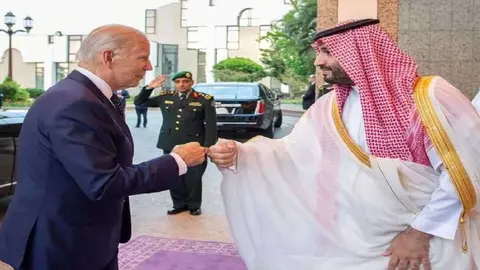Blinken reaffirms US commitment to Israel's regional integration

Washington, with the aim of expanding the Abraham Accords, will continue to work towards normalisation between Israel and the Arab nations of the Middle East. This was announced by US Secretary of State Antony Blinken during his official trip to Saudi Arabia. "The United States will continue to play an integral role in deepening and expanding normalisation," Blinken told a press conference with his Saudi counterpart Prince Faisal bin Farhan in Riyadh.
Blinken stressed that regional integration is a key issue in achieving a "more prosperous, stable and secure" Middle East. "The Gulf is more connected than ever, both as a region and with the wider Middle East, including Israel," he said. The UAE and Bahrain are the only two Gulf monarchies that have so far established relations with Israel under the Abraham Accords. Thanks to the so-called 'Deal of the Century' and US mediation, Sudan has also taken steps towards normalisation with Israel, while Morocco has resumed relations with the Hebrew state after decades.
Bin Farhan agreed with his US partner that normalisation with Israel 'is in the interest of the region' and 'would bring important benefits for all'. However, as he has stated on other occasions, the Saudi foreign minister assured that "any normalisation will have limited benefits" if a peace solution to the Israeli-Palestinian conflict is not reached first.
Met with Saudi Foreign Minister Faisal bin Farhan and discussed regional security, Sudan, and other issues. We resolved to continue to work together to counter terrorism and to support efforts to bring about a lasting peace in Yemen. pic.twitter.com/GD7spyFMVN
— Secretary Antony Blinken (@SecBlinken) June 7, 2023
For the US, normalisation between Israel and Saudi Arabia is a "priority". Washington will continue to take steps in this direction. "We will continue to work on it to move forward in the future," Blinken said.
Following his visit to Saudi Arabia, where he also met with Crown Prince Mohammed bin Salman in Jeddah, Blinken held a phone call with Israeli Prime Minister Benjamin Netanyahu. The US secretary of state and the Israeli leader discussed issues of common interest, including the expansion and deepening of Israel's integration in the Middle East, an official statement said.
Watch: #SaudiArabia's Crown Prince Mohammed bin Salman and #US Secretary of State Antony Blinken vow to work together to advance stability, security, and prosperity across the Middle East and beyond, the State Department says.https://t.co/ReyJTJ4aSL pic.twitter.com/CJCNpo6TfA
— Al Arabiya English (@AlArabiya_Eng) June 7, 2023
Blinken also stressed the need to maintain the commitments made to avoid steps that would interfere with peace plans and the two-state solution. The challenges presented by Iran, as well as Washington's "ironclad" commitment to Israel's security and the bilateral partnership, were also on the table during the conversation.
Despite China, the US-Saudi partnership remains strong
During Blinken's visit to the Kingdom, in addition to the future of Israel-Saudi relations and regional integration, the Secretary of State and Bin Farhan discussed counter-terrorism, as well as the situation in Iraq, Afghanistan, Yemen and Sudan.
Another interesting point of the meeting was Saudi Arabia's nuclear programme. "We would like to build our programme with the best technology in the world," admitted the Saudi prince, who acknowledged that Riyadh hoped to reach an agreement for Washington to help the Kingdom generate nuclear energy.
Leaving Saudi Arabia—a nation we have shared 80 years of partnership with—I am heartened by the new avenues for cooperation we've created with Saudi and @GCC partners. Together, we will continue our urgent work on Sudan, ensure ISIS stays defeated, and tackle global challenges. pic.twitter.com/EqyqwoQr1z
— Secretary Antony Blinken (@SecBlinken) June 8, 2023
Also during the press conference, journalists asked about the Kingdom's ties with China, as well as the re-establishment of relations between Saudi Arabia and Syria, two issues that are far removed from US interests in the region.
Bin Farhan acknowledged that the Asian giant is an "important partner" for Riyadh, as well as for other countries in the region. However, he stressed that "there is still a strong security partnership with the United States". In this sense, Blinken stressed that it is not necessary to choose "between the United States and China", although Washington will continue to demonstrate "the benefits" offered by its partnership.
Regarding Syria, the Saudi minister insisted that the solution to end the crisis in the country requires dialogue with Damascus, "regardless of what you may think about Bashar al-Assad". "We believe this is the best way forward," Bin Farhan added to Blinken, who has repeatedly expressed Washington's rejection of Syria's return to the Arab League.










